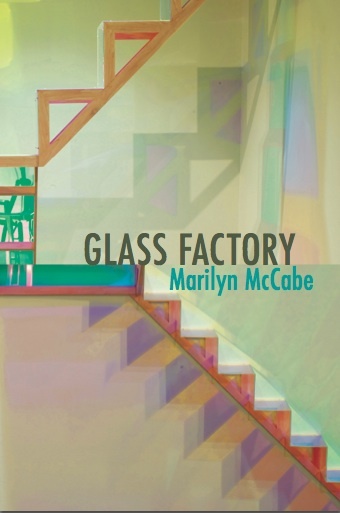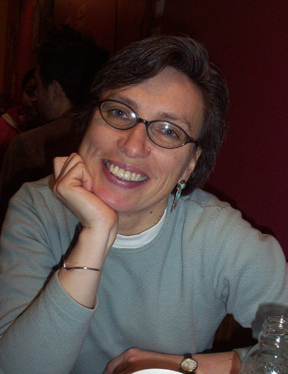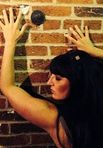Carpe Noctem Book Interview With Marilyn McCabe
 The Word Works, 2016 THINGS WE’RE DYING TO KNOW…
The Word Works, 2016 THINGS WE’RE DYING TO KNOW…Let’s start with the book’s title and your cover image. How did you choose each? And, if I asked you to describe or sum up your book, what three words immediately come to mind?
Two poems in the collection address my recollections of poking around in the history and actual remains of glass factories -- I had an archaeology minor in college, so some of this came about as part of a project in that pursuit. There's something magical about glass -- that it's both solid and liquid, can reflect, refract, and disappear. And the idea of picking through ruins is such a metaphor for the creative process.
I had a number of different ideas for the cover, ranging from trying to find what one photo site called "factory porn" to something abstract involving glass shards, but when I found an image of a sculpture of a glass-like staircase by Victoria Palermo, an acquaintance of mine, I knew I'd found the exact right thing.
Three words: absence, ephemerality, change.
What were you trying to achieve with your collection? Tell us about the world you were trying to create, and who lives in it.
I've lost several contemporaries in the past couple of years, as well as a very young friend, and a very old friend; and my 95-year-old mother broke her leg, requiring us to find her new lodging and a new life situation, which required that I pack up and/or throw away much of the accumulations of her life. Out of this spring-tide of loss, grief, and managing change came these poems.
Can you describe your writing practice or process for this collection? Do you have a favorite revision strategy?
Poems begin in any number of different ways for me. Often with an image. Sometimes a line. Sometimes I squeeze something out of myself through writing prompts -- e.g., I tell myself to write for ten minutes on "blue" without stopping. If nothing else, it gets my hand moving (my first drafts are always in long hand).
I love the revision/editing process, from beginning to end -- from scrutinizing my own choices to arguing commas and hyphenation with my editor. If a poem doesn't seemed to be realized, I'll say to myself, "Okay, write for ten minutes without stopping in answer to this: 'What I'm really trying to say is...'." I like to turn poems upside down to see if I can learn something new from that perspective. Sometimes I try to rhyme, then unrhyme. It's all play at this stage.
How did you order the poems in the collection? Do you have a specific method for arranging your poems or is it sort of haphazard, like you lay the pages out on the floor and see what order you pick them back up in?
I tend to try to impose some kind of logical order. I have a logical mind, sometimes overly so. Or I try to capture some kind of suggestive narrative arc. With this collection, though, the editor suggested a reordering that moved apart some poems that address similar things or draw from similar kinds of images. By moving them apart a kind of weaving effect was created, with resonances sounding through the collection rather than gathered in single areas. I loved this idea and will keep it in mind in future projects of ordering poems in a collection.
What do you love to find in a poem you read, or love to craft into a poem you’re writing?
I love big ideas. I love poems that start with a small detail and then kapow you with a big idea. I don't know if I do that in my work, but I wish I would.
Can you share an excerpt from your book? And tell us why you chose this poem for us to read – did it galvanize the writing of the rest of the collection? Is it your book’s heart? Is it the first or last poem you wrote for the book?
The collection starts with this poem. It speaks to the emotional core of the collection, the fierceness of loss, but the beauty of life that has such pain in it. I'm also an insomniac, so ... there's that.
I await the night with dread; await the night with longing
With its black strokes, singing,
it smears me, lavish.
I’m the night’s white canvas
turbulent and stiff.
I can grab the burning
stars in my hand.
But I can’t let them loose.
If you had to convince someone walking by you in the park to read your book right then and there, what would you say?
Have you or are you in the process of experiencing loss? Come along with me and look at it lovingly. We can travel together.
For you, what is it to be a poet? What scares you most about being a writer? Gives you the most pleasure?
I think on the page, often. Poetry meets my natural taciturn tendency and pleases my mind's leap-making desires. I tried to become a fiction writer, but I'm not a natural storyteller. I tried to write essays, but my anxiety about meaning-making led to plodding and uninteresting work. With poetry I can suggest, wonder, be silent, joke, sigh. What scares me most about being a writer is what scares me most about being a human being -- that I'll be too content for too long to stay on the surface of my encounter with the world, that I won't dig deep enough to really think/feel/observe all the wonder. It's fun to be in the midst of inspiration, but, as I said before, I love rolling up my sleeves and editing. Would that I were as fierce with my own work as I am with my long-suffering poet friends. I'm constantly chucking entire stanzas of their work; I may be a little too easy on myself.
Are there other types of writing (dictionaries, romance novels, comics, science textbooks, etc.) that help you to write poetry?
I read widely in nonfiction -- science, theology, political history. But whenever I'm stuck for inspiration, I go to art museums. I'm going to be a writer in residence for a week at MassMOCA (the Massachusetts Museum of Contemporary Art) and I'm very excited by that lengthy access to big ideas and the kinds of wacky installations featured there.
What are you working on now?
Taking a hint from Rilke's dingedichte, "thing poems," I'm considering objects and letting poem leap out of them.
What book are you reading that we should also be reading?
I'm loving Lisa Sewell's Impossible Object. And I'm rereading for the umpteenth time Ellen Bryant Voight's Flexible Lyric. I also just got Rebecca Solnit's latest book of essays out of the library. She leaves me breathless.
Without stopping to think, write a list of five poets whose work you would tattoo on your body, or at least write in permanent marker on your clothing, to take with you at all times.
Yeats's "Second Coming," something from Gluck's Wild Iris, Bob Hicok's "Bars Poetica," Bruce Beasley's "Aphasic Echolalia," and Mary Oliver's "Wild Geese."
What’s a question you wish I asked? (And how would you answer it?)
What's my greatest struggle as a writer? Continuing to make work regardless of the outcome, regardless of rejections, regardless of self-doubt, regardless of the self-limitations I run into or impose, and to make work gladly and with a sense of play. To maintain the sense of play seems vital to me and I often lose it to worry or earnestness or some other terrible intention. To maintain lightness is, ironically, my struggle.
***
Purchase Glass Factory from The Word Works.
 Marilyn McCabe’s second full length collection of poems, Glass Factory, was released in spring 2016 from The Word Works. Her poem “On Hearing the Call to Prayer Over the Marcellus Shale on Easter Morning” was awarded A Room of Her Own Foundation’s Orlando Prize, fall 2012, and appeared in the Los Angeles Review. Her book of poetry Perpetual Motion was published by The Word Works in 2012 as the winner of the Hilary Tham Capitol Collection contest. Her work has appeared in literary magazines such as Nimrod, Valparaiso Poetry Review, and Painted Bride Quarterly, French translations and songs on Numero Cinq, and a video-poem on The Continental Review. She blogs about writing and reading at marilynonaroll.wordpress.com.
Marilyn McCabe’s second full length collection of poems, Glass Factory, was released in spring 2016 from The Word Works. Her poem “On Hearing the Call to Prayer Over the Marcellus Shale on Easter Morning” was awarded A Room of Her Own Foundation’s Orlando Prize, fall 2012, and appeared in the Los Angeles Review. Her book of poetry Perpetual Motion was published by The Word Works in 2012 as the winner of the Hilary Tham Capitol Collection contest. Her work has appeared in literary magazines such as Nimrod, Valparaiso Poetry Review, and Painted Bride Quarterly, French translations and songs on Numero Cinq, and a video-poem on The Continental Review. She blogs about writing and reading at marilynonaroll.wordpress.com.
Published on June 01, 2016 06:02
No comments have been added yet.



